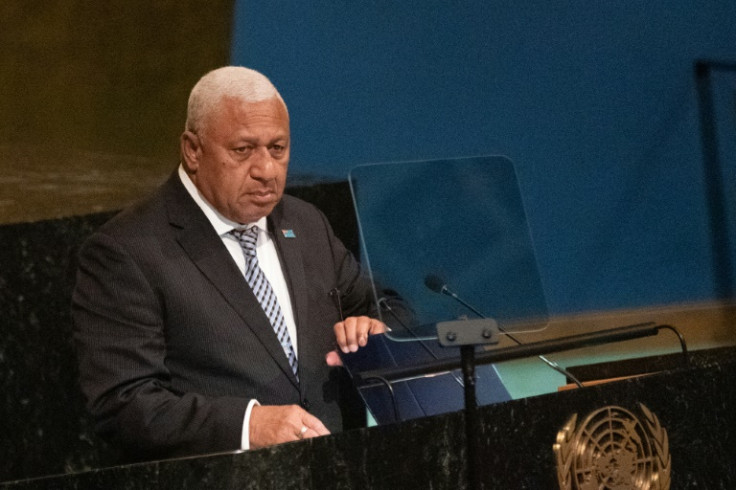Ex-coup Leaders Face Off In Tight Fiji Election

Fijians go to the polls on Wednesday after a bitter and close election race between two ex-coup leaders that could test the Pacific nation's fledgling democracy.
Prime minister and former military commander Frank Bainimarama came to power almost 16 years ago in a bloodless coup, but is looking for a third elected term via the ballot box.
To win, his FijiFirst party will have to best that of long-time rival Sitiveni Rabuka -- an ex-prime minister and military commander who himself led two coups in 1987.
In recent years, Bainimarama has switched his fatigues for suits and colourful bula shirts and focused heavily on Fiji's fight against climate change -- an existential issue for the low-lying nation.
But the run-up to the vote has been marred by allegations of corruption, prosecutions of rival politicians and threats against journalists.
Many local commentators are fearful of speaking publicly about a vote that is expected to be a close-run affair.
"Some are concerned another coup is on the cards," said analysts Lucy Albiston and Blake Johnson, writing for the Australian Strategic Policy Institute.
"Although there are no reliable pre-election polls, it's looking like Rabuka might win," they said, noting Bainimarama had not pledged to respect the result while his rival had.
But after democratic votes in 2014 and 2018, there are hopes Fiji can again avoid a return to instability that saw four coups in the last 35 years.
The military's role will be key, and commanding officer Major General Jone Kalouniwai has insisted his forces will "honour the democratic process by respecting the outcome".
Lobby group Freedom House rates Fiji as "partially free", with the "repressive climate" of previous coups easing.
However, the group has also noted "the ruling party frequently interferes with opposition activities, the judiciary is subject to political influence, and military and police brutality is a significant problem".
Bainimarama has painted the election as the "most important election ever" after a tumultuous few years of pandemic-induced pain.
Covid-19 travel restrictions put thousands reliant on the tourism industry out of work and sent the national debt skyrocketing.
"We know the stakes: our recovery, our jobs, family support, strong leadership that serves everyone equally," said Bainimarama in a campaign stop ahead of a pre-election media blackout.
Previous Fiji elections had been largely split down ethnic lines between Indo-Fijians -- descended from indentured labourers brought from India -- and the Indigenous Fijians, or iTaukei.
Bainimarama was one of the first politicians to grasp the importance of building a coalition of the two.
Yet holding power since 2006 could be both a "curse and a blessing" for him at the polls, according to Suva-based political commentator Shailendra Singh from the University of the South Pacific.
"A curse in that people might feel that this government has been in power too long," Singh told AFP.
"There might be voter fatigue -- the same government and the same faces, the same messages."
Singh believes the high cost of living, with inflation around five percent, will weigh on voters' minds.
"Rightly or wrongly, the government will get most of the blame for it, so I believe it will be a major determining factor in how people vote," he added.
In a final campaign rally, Rabuka -- a former Fiji international rugby player -- said Fijians were ready for change and predicted victory was at hand.
"After 16 years of disastrous dictatorial rule, we're coming very close to the end of it," he told supporters. "We will be consigning them to the dustbin of history where they rightly belong."

© Copyright AFP 2024. All rights reserved.




















